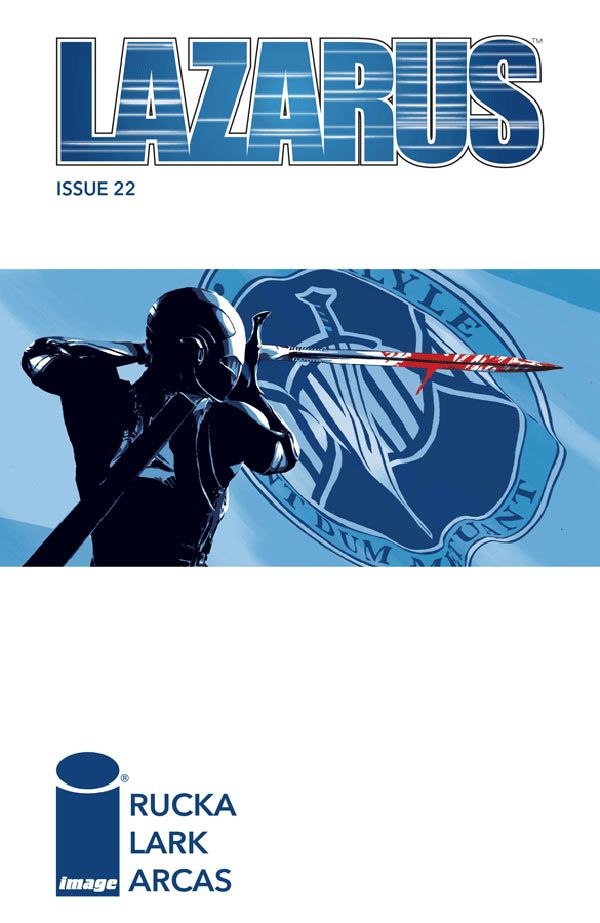After a six-month hiatus, Greg Rucka and Michael Lark's "Lazarus" #22 kicks off "Cull." This new story arc begins shortly after the cliffhanger ending of "Lazarus" #21, which revealed a new player in the Carlyle Family's power struggle and the ongoing war with Hock's forces. "Lazarus" #22 marks a solid beginning for a new story arc and the return to a regular monthly schedule for a consistently strong series.
The opening sequence is half of a bookend, showing a black-armored group invading Rausling's territory. Rucka returns to their activities in the last scene, which benefits from Lark's taut linework and transitions as well as Rucka's dialogue for Rausing's nasty-tempered, bigoted Lazarus Cristof Mueller. Over these first few pages, Lark's near-silent storytelling builds mood and mystery about the affiliation of the group, since the captions remain silent about their identity. Cutting away from Forever's plight feels like a necessary pause for air, but the sequence goes on a little too long; the composition of the flight formation and Santi Arcas' blue palette just don't generate enough visual or dramatic interest to justify three pages and a double-page spread.
Rucka circles back to Forever's status with a flashback, and the action is fast-paced from there. Unfortunately, Forever -- usually the emotional anchor and moral compass of the story -- is out of action, but no other character fills Forever's shoes as a trustworthy point-of-view character; as a result, "Lazarus" #22 feels less cohesive and more rushed than previous issues.
It comes as a shock to realize that the sequences with a younger Forever in the earlier "Life" storyline were probably occurring in the present day instead of in the past. Eve, or the younger Forever, still comes across as a cute kid despite her training, and accordingly, she's especially vulnerable to being played by Johanna Carlyle.
With Forever out of commission, Johanna's characterization comes to the forefront in "Lazarus" #22. The reminders of her double-crosses and her casual usage of other people are kept fresh as she talks with Marisol about Gabriel Mason. Her decision to separate Sonja and Eve is cold-hearted, if justifiable from a security standpoint, and even her hug has a chill to it; it serves as a nice parallel to the hug Jonah gave Forever all the way back in the debut issue.
It'd be logical to label Johanna as a sociopath, but then Rucka and Lark upend that easy categorization mid-issue. Johanna cries over Forever's unconscious body openly, in a place where there seems to be no one around to see it. Lark's facial expressions, always strong, are particularly eloquent as the tears pool and fall down Johanna's cheek. Her face looks innocent, devoid of her usual contempt or charm or calculation. She looks younger and sincerely grieved, with wide-open eyes. It's a nice shock after all of her purely self-interested and ruthless behavior.
As "Lazarus" progresses, Johanna transcends the usual stereotype of a sexy and black-hearted woman. She's shown herself to be more capable than her brother Stephen in strategy, showmanship and persuasion, at least compared to others members of the Family. In the absence of Malcolm, arguably no one else was better suited to persuade Morray and Carragher to remain Carlyle's allies.
"Lazarus" #22 provides interesting insight into Johanna Carlyle and shows that Carlyle's resident femme fatale might still have a heart, posing the intriguing question of whether Johanna can be reformed despite her readiness to betray anyone at the drop of a hat and her heartless treatment of Waste, Serfs and Family alike.

